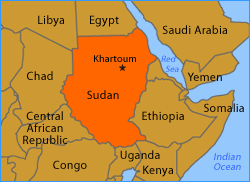Life in Sudan varies substantially from region to region, as the Arab-dominated north bears little resemblance to the mostly black African south. The Arab Muslim leadership governs by Sharia (Islamic fundamentalist) law, while the African population is largely animist and Christian — though a substantial number are Muslim. Sudan was torn by civil war for decades, with at least 2 million people dying from violence and famine. In the mostly Muslim western province of Darfur, government-sponsored Arab militias known as “janjaweed” have pillaged African villages, killing men and raping women by the thousands — sometimes working in concert with government troops. As many as 400,000 people have been killed, and more than 2 million have been displaced. The janjaweed have employed rape as a war tactic, apparently not only to terrorize the population but also with the intent of fathering a generation of half-Arab children to African women in Darfur.
In the north, women face sexual subjugation of a different sort: female genital mutilation. Though officially illegal, the practice remains common in Sudan, with female circumcision rates thought to be around 90 percent in northern provinces. Less violent but more pervasive than rape and genital mutilation, Sharia law strictly controls the day-to-day actions of Sudanese women — mandating the headscarf on the street and subordination to men in the home. Yet women in Sudan are not without rights: they hold about 10 percent of the seats in the national assembly, and they also serve in the military and on the High Court. Still, Sudan’s 20 million women face an uncertain future. In July 2005 — six months after brokering a peace accord and three weeks after becoming vice president — former southern rebel leader John Garang died in a helicopter crash. Without him, stability may again prove elusive in one of the world’s most desperate countries — for men and women alike.
- Previous: Saudi Arabia
- Next: USA



